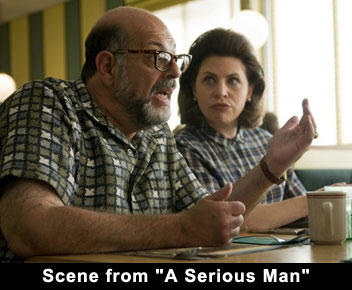Evil Always Impersonates Goodness
November 1, 2020
The Coen Brothers' brilliant 2009 movie, A Serious Man, showed the bankruptcy of Judaism as a religion. (See my review below.)
Until now, I didn't understand the intriguing Yiddish fable at the beginning of the film.
A Dybbuk is a malevolent spirit of a deceased person who wanders the world spreading evil. In the fable, (see the video) an affable Dybbuk convinces the husband that he is not the malevolent spirit of a dead man, and that rumors of his death were premature.
But the vigilant wife is not fooled and takes decisive action. She stabs Dybbuk in the heart. Indeed, he does not bleed for he is already dead.
Evil always impersonates goodness. Think all of our political leaders. Think Fauci and Bill Gates. They pretend to have our best interests at heart when in fact they are Satanists, traitors and gangsters.
Significantly, this Yiddish parable is not from Jewish folklore. Is it that hard to find anything genuinely moral in Jewish folklore? The Coen Brothers wrote it as an important reminder that evil must be unmasked and banished from the body politic through bold action. This 7 1/2 minute video will make a lasting impression.
-----REVIEW-----
The parable is also a metaphor for Judaism itself, a satanic cult defined by Cabala (Satanism) masquerading as a religion; death stalking the world. Cabala taints and ultimately destroys whomever it touches, Jew and non-Jew alike. First Satanism infected Jews, then the world through Freemasonry (Jewish Cabalism.) We allowed them into our home, the economy and body politic, and as a result, we are satanically possessed and face terrible Biblical retribution.
Updated from Dec. 30, 2017
Hollywood has been accused of portraying Christianity with a jaundiced eye while sugarcoating Jews and Judaism. Or it presents Jews as non-Jews.
Finally, there is a movie that presents Jews realistically. "A Serious Man," by Oscar-winning writer-directors Joel and Ethan Coen, satirizes many Jewish types and suggests Judaism is a fraud.
If this begins a trend toward honest self-examination, there is hope yet for the self-chosen people.
Set in Minneapolis in 1967, "A Serious Man" is an homage to the Coen brothers' Jewish upbringing. The protagonist is physics teacher Larry Gopnik, played by stage actor Michael Stuhlbarg who, like the Biblical Job, is beset by a multitude of difficulties.
 "I didn't do anything wrong," he protests when Judith, his pouting wife, announces she is leaving him for Sy Ableman (pictured together, left.) Larry is a "serious man" -- hard-working, ethical and responsible. Why is God testing him?
"I didn't do anything wrong," he protests when Judith, his pouting wife, announces she is leaving him for Sy Ableman (pictured together, left.) Larry is a "serious man" -- hard-working, ethical and responsible. Why is God testing him?Larry turns to a friend, Mimi for sympathy. "It's not always easy, deciphering what God is trying to tell you," she says. "We're Jews, we have that well of tradition to draw on, to help understand. When we're puzzled, we have all the stories that have been handed down from people to people."
In fact, that well is dry. Gopnik visits rabbis who tell stories unrelated to his dilemma. One tells him to find "Ha Shem" (God, the "name") everywhere, even in the parking lot. Another relates a story about a dentist who found Hebrew letters on a Gentile's teeth. "What does this story mean?" Gopnik says. "I don't know," the rabbi replies.
Finally, Gopnik pleads for an audience with the revered Senior Rabbi Marshak. "He's busy," his battleship of a secretary tells Larry. "He doesn't look busy," says Larry.
"He's thinking," the secretary assures him.
After his Bar Mitzvah, Gopnik's son Danny does get an audience with the fabled Marshak. Danny waits in eager anticipation for the wisdom that marks his induction into the Jewish fraternity.
Finally, the great rabbi opens his mouth and quotes the Jefferson Airplane's song "Somebody to Love." (1967)
When the truth is found to be lies
and all the joys within you dies
don't you want somebody to love
don't you need somebody to love
wouldn't you love somebody to love
you better find somebody to love
Funny? Yes, but also true. This became the credo of our time. Jews were at the forefront of substituting romance and sex for religion. Perhaps it was born out of alienation from their own "religion."
Compare with Paul Simon, "Kathy's Song," 1965
And so you see I have come to doubt
All that I once held as true
I stand alone without beliefs
The only truth I know is you.
A JEWISH CONVERSATION
Joseph Sobran said that working for the National Review for 21 years was like listening in on a conversation between Jews. This observation doesn't only apply to political discourse. Jews, often Illuminati Jews, oversee cultural discourse in general. They arrange the spectacles astride our noses and decide who will govern.
In "A Serious Man" we are privy to a conversation Jews are having about themselves. Finally, we are witnessing some honest self-criticism. As Village Voice critic, Ella Taylor wrote, "A Serious Man is crowded with fat Jews, aggressive Jews, passive-aggressive Jews, traitor Jews, loser Jews, shyster-Jews, emo-Jews, Jews who slurp their chicken soup, and--passing as sages--a clutch of yellow-teethed, know-nothing rabbis."
 Indeed, the Coen Brothers have done for Jews what Fellini did for Italians. I don't think there is malice intended but rather a recognition of Jewish limitations in style, culture, and religion, i.e. the stultifying parochialism, conformity, status-seeking and meaningless observance.
Indeed, the Coen Brothers have done for Jews what Fellini did for Italians. I don't think there is malice intended but rather a recognition of Jewish limitations in style, culture, and religion, i.e. the stultifying parochialism, conformity, status-seeking and meaningless observance. The film also exposes the seeming contempt Jews have for non-Jews, the "goy." Gopnik's gentile American neighbors are hunters who come home with a bloody deer carcass strapped to the roof. There is a revealing scene where Gopnik is confronted at home by the father of a South Korean student he failed. The gentile neighbor comes to Gopnik's defense. But Gopnik dismisses his support and prefers to dicker with the new immigrant.
Is this movie Jewish self-hate? I don't think so. Jews recognize honest satire and find it refreshing. I sat beside a middle-aged Jewish couple who roared with laughter. Ultimately, Jews are the first victims of their own culture. They have been deprived of the rejuvenating benefits of genuine self-criticism.
"A Serious Man" is a major improvement from the Coen's last two movies. "No Country for Old Men" and "Burn After Reading" were bleak, violent and nihilistic. It's great to see these talented filmmakers examine a recognizable reality.
I don't know why people have so much trouble with the concept of "God." He is synonymous with our spiritual ideals: absolute truth, goodness, justice, peace, beauty, and love. We have no choice but to believe and act in His name.
 Yes, bad things happen to good people like Larry Gopnik. But that's not God's fault. Usually, it's our fault, other Godless people or an accident of nature. In fairness to God, more bad things happen to bad people.
Yes, bad things happen to good people like Larry Gopnik. But that's not God's fault. Usually, it's our fault, other Godless people or an accident of nature. In fairness to God, more bad things happen to bad people.The general defamation of God and religion has more to do with the Illuminati conspiracy than anything else.
---
Related- MAKOW - The Devil and the Jews







Marcos said (November 2, 2020):
The movie "A Serious Man" reminds me of the testimonies of Jewish people who converted to Jesus Christ (link below).
In almost all cases, before converting, they sought the help of a rabi to discuss their doubts and understand the subject, only to be met with extreme hostility and absolutely no answers. In one case the rabi just threw the Bible on the man's head.
https://www.youtube.com/playlist?list=PLXiBkdTbRi-wmDEU85JJcZbqDw8RoOxOc